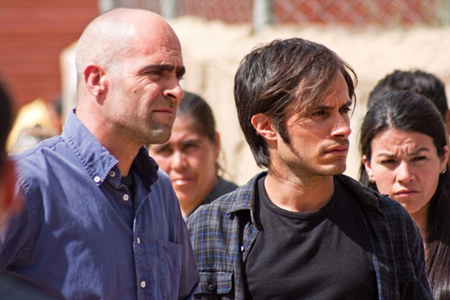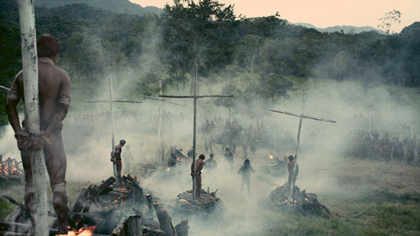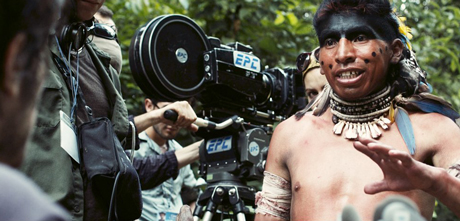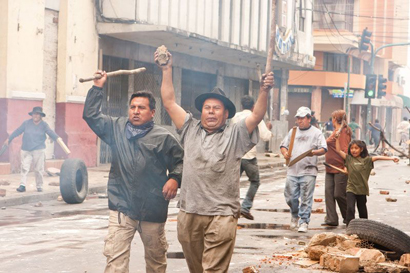
 |
|
|
|
(Disclaimer Note: this is a review of a political movie, with political thoughts intact.) A movie about a movie crew making a movie, yet that doesn't insult one's intelligence, Even the Rain (También la lluvia) addresses one of the most important issues of our time, one that seems to be approached only in documentaries. But it has a lot on its mind. Early on it notes the fact that America's inability to read subtitles causes serious foreign movies to be locked out of the commercial film market. The film-within-a-film's producer states that he could have easily raised all the money and more for production if his "artistic" director would have agreed to film in English. But if he films in English, the entire show will seem false. There are so many ironies in Even the Rain that we barely register the fact that it is performed in the appropriate language, Spanish. 
The project broadcasts an important message, one that isn't being heard in the American media. Writer Paul Laverty has years of experience working with British director Ken Loach, a specialist in gritty movies about working class reality. Stars Gael García Bernal & Luis Tosar, and actress-turned director Icíar Bollaín are invested in Laverty's fictional story around a very real protest in Bolivia in 2000, that strikes at the heart of the controversy over the new global economy. A multinational film crew has come to Cochabamba, Bolivia to film their movie about Christopher Columbus landing his ships on Hispañola and subjugating its original (now extinct) Taino natives. The show being prepared is an anti-colonial message film using real dialogues from the diaries of a priest named Montesinos, who took the side of the natives against the Spanish Empire, when a Taino warrior named Atuey rose up in rebellion. Running in clear parallel to the Columbus story is the real Bolivia around the filmmakers, where rich landowners are still suppressing the rights of the indigenous Indian population. Director Sebastián (Gael García Bernal) is looking for artistic perfection, while his producer Costa (Luis Tosar) is more interested in saving money. They are here because they can get Bolivian extras for $2 a day, even though the local Indians look nothing like those in the Caribbean. The actors are particpating for various reasons. Actor Antón (Karra Elejalde) has the perfect imperious attitude to play Columbus, but he's arrogant in person as well. Against Costa's recommendation, Sebastián hires Daniel, an angry young Indian activist (Juan Carlos Aduviri) to play Atuey. Daniel's daughter takes a part as well. She's fascinated seeing herself on screen during dailies. Sebastián is frustrated by some of Daniel's habits, but everyone panics when they find out that he's a leader in a local Indian uprising against the Aguas de Colombia (Waters of Columbia) company, which is preventing the Indians from digging their own wells. It seems that the Colombian water rights have been privatized: all the water rights. Locals must purchase water from Aguas de Colombia at prices no simple laborer can afford -- $450 per year per person. It is illegal to dig wells or drink from streams or even collect rain water! 
Filming is disrupted when demonstrations break out, with Daniel as a main organizer. Sebastián and Costa appeal to the President, who reminds them that the film company is technically exploiting the Indians as well. The "Idealist" Sebastián has no answer to that. Daniel takes Costa's bribe to stay away from the rioting, but goes anyway. Costa bribes a police official to let Daniel out of jail just long enough to finish a crucial scene, of Atuey and his warriors being burned alive by the Spaniards. But Daniel escapes, and leads a full shutdown riot in Cochabamba. The movie people must flee to a different location. Just as they are leaving, Daniel's wife appears. The daughter has been wounded in the fighting, and she begs Costa to help get her to a hospital. Costa and Sebastián must decide what is really important, as the city is sealed off around them and their actors begin to panic. Paul Laverty wrote the best modern movie about the Irish nationalist cause, 2006's The Wind that Shakes the Barley. This very smart script avoids the pitfalls of issue-oriented liberal cause movies, by placing its main event -- the Cochabamba Water Riots of 2000 -- in a multilevel context. The producer and director played by Bernal and Tosar are inspired by diaries that prove that there was a 'liberal outrage' in the Spanish priesthood against the cruel subjugation of the New World. Their movie shows Spaniards forcing natives to bring them gold and chopping off the hands of those that don't meet the quota. Yet shooting a socially conscious movie is not the same as being politically committed. One of Costa's production people begs for a camera to film the Water Riots, but he refuses. The shifting attitudes among the cast and crew provide the interest, especially when the quiet, brooding Daniel, a small but morally powerful Indian, holds a mirror up to the hypocrisy around him. After selling Daniel on the social value of the film, producer Costa is caught bragging about his access to cheap labor. When speaking to the Indians, the production represents the film-within-a-film as an exposé of colonial evil. When talking to Bolivian officials, it's about the courageous priest Montesinos that took a moral stand for the church. The Priest Montesinos' diary reveals his wonder at the discovery that the Taino Indians don't really have private property are incapable of understanding the nature of Spanish greed. During the filming, Sebastián encounters the same kind of cultural disconnect. He asks a group of Indian women to act as if they are drowning their babies in a river, with toy babies as props. Historically, some native women did that 500 years ago to avoid surrendering to the Spaniards. But the modern extras won't pretend that terrible action for the movie cameras. It's just not within the range of things they can conceive. "Sebastián," says Daniel, "some things are more important than your film." 
Even the Rain is a breathtaking drama and an important social document that doesn't rely on liberal outrage to make its point. When I first learned about the corporate conspiracy to privatize Bolivia's natural water resources in the excellent documentary The Corporation, it seemed unbelievable. But it's true. Everything now has a price tag. Indigenous peoples are considered as captive customers. They have no more rights than would wildlife. 1 500 years ago the Spaniards killed Indians to get what they wanted: gold. In 2000, Aguas de Tunari (a venture of Bechtel and Suez Lyonaise) licensed the rights to Bolivia's and jacked up the rates to pay for a new dam. We first see some neighborhood women attacking an Aguas utility truck that tries to seal up an illegal well. Then a squad of police is driven out of the neighborhood by a mob. When the utility delivers water bills, Daniel rallies the Indians to burn them, and the rioting begins. If Daniel is jailed or killed, the movie will fall apart. Producer Costa thinks he can simply relocate to a different province but most of the crew have no intention of placing themselves at risk -- they have families and careers at stake back home, where it's safe. Ironically, the actor who has expressed the least sympathy to the Indians thinks they ought to stay and struggle through. And the artist Sebastián would prefer that everybody risk their necks so he can have a personal triumph. The pinchpenny Costas is the one that finally makes a humanist stand -- not for the rebels but to make good on his promise to look after Daniel's daughter. The finale is a well-earned emotional moment undisturbed by excess sentiment. Even the Rain is an intense entertainment with characters we care deeply about. Despite the discussion above, it is not a lecture about the evils of privatization. Paul Laverty's script will make viewers more curious about this very important event. This reviewer responds to one very important fact: I have never seen the Bolivian water dispute and riots covered as a network news story in America, not once. As far as our news is concerned, Bolivia and Ecuador are now part of a Venezuelan-Cuban conspiracy, and things like the water rebellion are the result of communist agitation. And pundits claim that the media are dominated by the left! 
Director Bollaín guides the movie with a sure hand, working in telling details. A giant cross for Sebastián's movie set is flown in by helicopter, referencing the movie-about-moviemaking theme from Fellini's Otto e mezzo. Daniel gives Costa a little bottle of water, teaching him the Indian word for it: Yaku. Gael García Bernal is fine as the serious young director while Luis Tosar has the more sympathetic part as the producer who finally makes an emotional commitment. Stealing every scene is Juan Carlos Aduviri as Daniel. The relatively diminutive Indian is as smart as a whip, and knows that the only way to get anything is to make himself heard, loudly. In costume and war paint, he cuts a terrific figure as the film's Atuey. Image Entertainment's DVD of Even the Rain (También la lluvia) is a fine enhanced transfer with excellent color and sound (the music track by Alberto Iglesias is quite good as well). We wish that it qualified for Blu-ray but apparently not. I don't recall the movie even getting a full art film release in Los Angeles; I saw it at a special American Cinematheque screening. For now, this is the way to see this superior movie -- which is strongly recommended.
On a scale of Excellent, Good, Fair, and Poor,
Even the Rain (También la lluvia) rates:
Footnotes:
1. (completely unsolicited thought inspired by Even the Rain) Think that perhaps the American middle class is getting a bad deal? Then stop the privatization of what should be public resources and services. It just encourages greed and manipulative profiteering. Corporations can already charge whatever they wish for gas, power and water. Our health care is unaffordable yet profits for all these industries are at record levels. Like Burt Reynolds says in Robert Aldrich's Hustle: America is now just another Banana Republic, but with color TV. You're next.
Reviews on the Savant main site have additional credits information and are often updated and annotated with reader input and graphics. Also, don't forget the 2011 Savant Wish List. T'was Ever Thus.
Review Staff | About DVD Talk | Newsletter Subscribe | Join DVD Talk Forum |
| ||||||||||||||||||